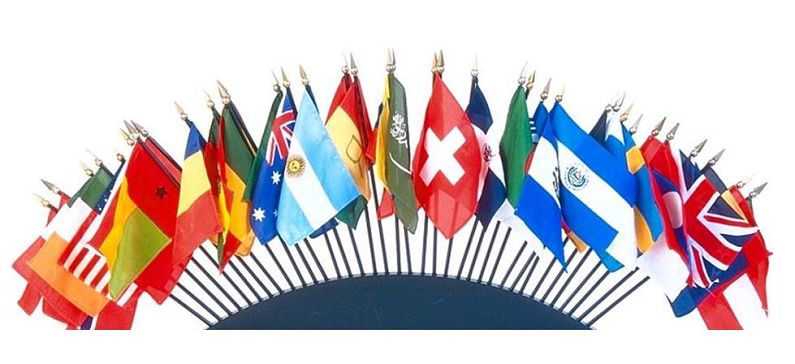
Tips about life in multicultural environments
We’re often misunderstood in life, especially when surrounded by people from different cultures. I have spent 7 years studying and working in Spain and the United Kingdom, mingling with ambassadors of different nationalities and I have learned the following:
If an Asian offers you soup, let them believe that you’re a noisy eater – like an old Greek villager. The louder you slurp over the wide Asian porcelain spoon, the happier your Asian host.
When a Chinese has a good laugh looking straight in your eyes, they are not necessarily falling in love with you, nor are they simply having a good time or recalling a recent joke. When a Chinese has a good laugh looking straight in your eyes, they’re just FEELING AWKWARD.
If you accidentally touch a Mongolian with your foot, you shall immediately touch their hand too, as a way to excuse yourself. Otherwise, your gesture may be taken as an insult.
Moreover, if they pour you some wine in Mongolia (traditionally served in a bowl rather than a wine glass), you must drink it all and your host will refill your bowl straightaway. Again, you must drink your refill and so on. It’s a thing of honour to drink all the wine in the bowl, especially for men. However, one has the option to set their glass upside down on the table, signaling that they have had plenty of wine already. In any case, beware of your drinking decisions, as in other Asian cultures setting your glass upside down may offend your host.
It’s a piece of cake to drive a British crazy. You simply start using American words, like sidewalk for pavement, elevator for lift etc. Use the same method in writing, like color for colour, center for centre etc.
To play ignorant about the Iranian and Egyptian culture, ask the following question: “How do you say this or that word in Iranian/Egyptian?” In a mood of slight irritation, you will be informed by the indigenous person facing you that official languages are Persian and Arabic in the two countries respectively and also that Iranian or Egyptian languages do not exist.
Not all Asians speak Chinese. To many (e.g. to Japanese) Chinese is a foreign language; exactly what it is to us! Not long ago, a Chinese-learning British office-mate of mine started talking in Chinese to a Vietnamese girl. The girl went furious and started yelling at him, “I’M NOT CHINESE!” Needless to mention the case of Macau inhabitants whose mother tongue is often Portuguese!
Distinct differences in facial features of Asians really exist, like between the Vietnamese and the Koreans, just like between the South and the North Europeans. Despite my obvious South European looks, a Japanese girl once asked me whether I come from Manchester. (!)
The Belgium Flemish will not be happy to hear you addressing them in French. However, all Flemish speak French, but they prefer to relate in English with a non-francophone.
Although Portuguese speakers (Portuguese and Brazilians in their majority) relate with the Spanish language, you won’t be highly appreciated, if you speak to them in Spanish. Nor will you be able to turn an Italian into a happy man by pointing out the similarities between Spanish and Italian words, despite the fact that both Italian and Spanish are languages of Latin descent.
Given the fact that the term American is used to identify the citizen of the United States, try to address a Canadian as Canadian and not as American, though, in theory, all inhabitants of North, Central and South America are Americans . Also, a Scottish and a Welsh are not English; they are British, much as Scotland, Wales and England constitute Great Britain.
The th sound in Spanish is overly misused. In Spanish spoken in Spain (with the exception of the Canary Islands where pronunciation rules are similar to the ones used in Venezuela) the s sound is still present. Therefore, not all s sounds are replaced with th. However, the th sound is nowhere used in the Hispanic countries of America.
Apparently, general knowledge skills should not be taken for granted. For instance, I happened to be asked where in Italy is Greece located and –in a work context– what’s the capital of Scandinavia.
Italians don’t move their hands like crazy while talking. A North European will often, mistakenly, try to use hand mannerisms insanely when talking to an Italian.
Greeks don’t enjoy smashing dishes at all times! Though we’re the official European dish-smashers, we always need to explain the story behind this bizarre custom of ours and thoroughly inform foreigners that it is rarely the case nowadays.
Suppose a Scandinavian invites you over for dinner. Chances are they ask you to “bring your own”; not your own drinks, but your own food. Though it’s currently becoming extinct as a habit, it still constitutes part of their culture!
Experience taught me that Italian expertise in pizza and coffee does not necessarily guarantee French expertise in wine and cheese.
The above are based on personal experiences of mine and I by no means intend to generalize or to offend; in Greece, we are not pioneers in multicultural morals, so I hope my tips are useful! Good Luck!
Petros S. Chamakiotis
Ph.D. Candidate
University of Bath
United Kingdom







